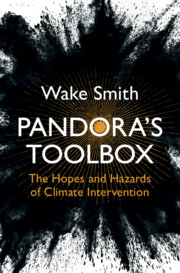Book contents
- Reviews
- Pandora’s Toolbox
- Pandora’s Toolbox
- Copyright page
- Dedication
- Contents
- Figures
- Tables
- Prologue
- Acknowledgments
- Section I Climate Introduction
- Section II Responses to Climate Change
- Section III Carbon Dioxide Removal
- Section IV Solar Radiation Management
- Section V Social Ramifications of Climate Intervention
- 16 Governance of Carbon Removal
- 17 Governance of SRM and SAI
- 18 Ethics
- 19 Public Perception
- Section VI The Path Forward
- Acronyms
- Appendix: Detail in respect of Figures 9.4–9.8
- Notes
- Index
19 - Public Perception
from Section V - Social Ramifications of Climate Intervention
Published online by Cambridge University Press: 24 February 2022
- Reviews
- Pandora’s Toolbox
- Pandora’s Toolbox
- Copyright page
- Dedication
- Contents
- Figures
- Tables
- Prologue
- Acknowledgments
- Section I Climate Introduction
- Section II Responses to Climate Change
- Section III Carbon Dioxide Removal
- Section IV Solar Radiation Management
- Section V Social Ramifications of Climate Intervention
- 16 Governance of Carbon Removal
- 17 Governance of SRM and SAI
- 18 Ethics
- 19 Public Perception
- Section VI The Path Forward
- Acronyms
- Appendix: Detail in respect of Figures 9.4–9.8
- Notes
- Index
Summary
Sweeping global climate interventions would be nearly impossible to implement without extensive public support. Surveys show an increasing and widespread global consensus that warming is real and constitutes a grave threat. The scientific community is virtually unanimous on these points, though this is poorly understood by the American public, which remains an outlier among developed nations in its degree of continuing climate confusion. Much of American climate exceptionalism derives from a well-funded domestic climate denial industry that has recycled tactics from the tobacco wars of the 1960s to preserve the appearance of scientific controversy where none exists. Despite that, an understanding of the gravity of the situation continues to coalesce. Conversely, knowledge about prospective climate interventions is exceptionally low. The primary exception is the somewhat misguided notion that planting trees can serve as a fully countervailing offset for carbon emissions. Another American oddity is the degree of stock placed in “chemtrailing” conspiracies. SAI is little understood among the general public but is met with strongly negative reactions when described, so much so that there is evidence of a “reverse moral hazard” effect whereby survey participants are more likely to favor strong mitigation if the alternative seems to be SAI.
Keywords
- Type
- Chapter
- Information
- Pandora's ToolboxThe Hopes and Hazards of Climate Intervention, pp. 296 - 312Publisher: Cambridge University PressPrint publication year: 2022



